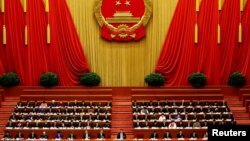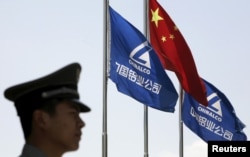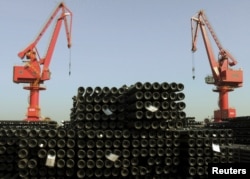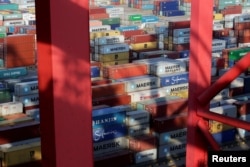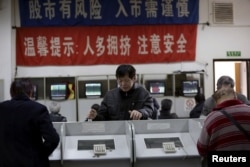China is responding to international criticism that it gives favorable treatment to state-owned enterprises (SOEs) while neglecting of the needs of foreign companies, and even foreign markets that buy Chinese goods.
Releasing the annual work report, or budgetary proposals, in the National People's Congress (NPC), Chinese Premier Li Keqiang signaled a crackdown on loss-posting "zombie enterprises" among the SOEs, and promised to make life easier for foreign investors. He also asked local governments to directly provide incentives to foreign companies in areas that are not dealt with by the central government.
"What we are seeing now is a recommitment to foreign investments. Both foreign and private Chinese capital will be given a greater role in the Chinese economy," Paul Gillis, co-director of the IMBA program at the Guanghua School of Management in Beijing, told VOA.
Political risks
In fact, the government is taking some serious political risks, such as joblessness, to woo foreign investors and reduce problems like overcapacity. It has also decided to tackle the issue of provincial and municipal officials who are known to favor local companies and block the path for foreign investors.
In recent months, European politicians have lashed out against the dumping of steel by Chinese companies, which allegedly take advantage of heavy subsidies in China to offer cut-throat price competition in foreign markets.
Li announced a major cutback of 50 million tons on steel production and 150 million tons on coal output in 2017. This is on top of a production decrease of 65 million tons in the steel industry and a shrinkage of 290 million tons seen in the coal sector in 2016.
These moves would result in a few million people losing their jobs in the steel and coal sectors, and put severe pressure on trade unions controlled by the Communist Party. China said last year 1.8 million jobs will be eliminated during the process of industrial restructuring, but has managed to cut only 726,000 of them, accounting for just 40 percent of the plan.
"This year, to reduce excess capacity, we need to make accommodation for 500,000 workers," Chinese Labor Minister Yin Weimin said last week. But Beijing is treading carefully because it fears serious unrest and street demonstrations resulting from large-scale layoffs.
Premier Li has gone a step further asking provincial and municipal governments to return some of the tax and other incentives that had been taken away from foreign investors in recent years. This is clearly in response to the decline in foreign direct investments, which dropped 9.2 percent in January.
"Local governments can, within the scope of the powers granted by law, adopt preferential policies to attract foreign investment," Li said in his annual Work Report Sunday. "China's door is going to keep on opening wider, and China will keep working to be the most attractive destination for foreign investment.”
Gillis said, "I think this gives the green light to local governments to try special incentives, such as those in the Shanghai Free Trade Zone, to attract foreign companies.”
“The growth of FDI inflows to China has been slowing down in the past few years. I think China’s leaders realize that it is important to continue to attract foreign companies to invest in China, not only for their money, but more importantly, for more advanced management skills and technical knowledge," Shanghai-based China Europe International Business School Professor of Finance Wang Cong said.
Walking the talk
Clearly, China is doing a reality check on its own treatment of foreign investors amid rising pressures from foreign markets and governments, including threats from the Trump administration in Washington to impose heavy duties on Chinese goods and declare China a currency manipulator.
Lu Suiqi, associate professor of economics at Peking University, said Li's announcements reflect China’s fears about U.S. President Donald Trump taking such hostile measures, and Li's promises to foreign investors represent a friendly first step. But he said more needs to be done by the government to prove it is capable of walking the talk (backing its words with actions).
“The key lies in the domestic political climate. If the political landscape in China becomes more liberal and democratic with more freedom, foreign investors’ concerns will be greatly eased,” Lu said.
China wants to go beyond wooing foreign funds. It wants foreign companies to raise funds in the Chinese market by listing in local stock markets and issuing bonds to Chinese investors.
"We will encourage foreign invested firms to be listed [in local stock exchanges] and issue bonds in China...," Li said unveiling new efforts to woo foreign investment, which fell sharply by 9.2 percent in January.
"Foreign firms will be treated the same as domestic firms when it comes to license applications, standard-setting, and government procurement...," he added.
Wang Cong said, "This is a smart move. Allowing foreign companies to issue stocks and bonds in China will broaden the pool of financial products that Chinese investors can hold and provide them access to securities issued by high-quality foreign companies. It is an important step in the process of the internationalization of the RMB (renminbi) because foreign companies will be able to raise proceeds in RMB when they issue stocks or bonds in China, and inevitably they will use the RMB raised to invest either in China or in international markets.”
Praising the government's move, Wang Jun, director of the Department of Information at the China Center for International Economic Exchanges, said, "Introducing foreign firms to list in the domestic stock markets also shows the country's confidence in the competitiveness of domestic companies, but technical obstacles such as information disclosure regulation need to be solved.”




